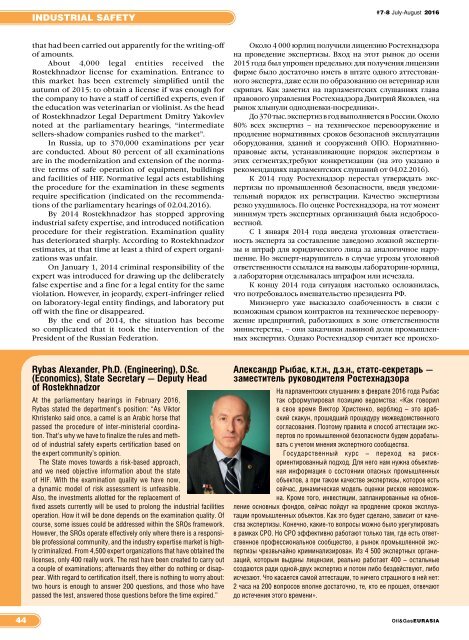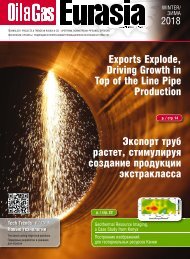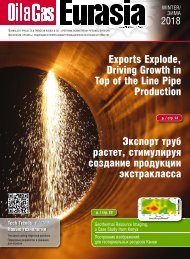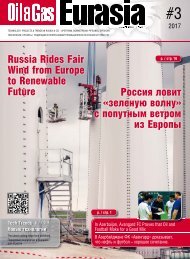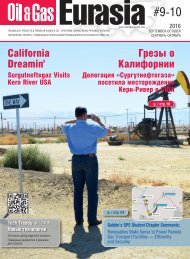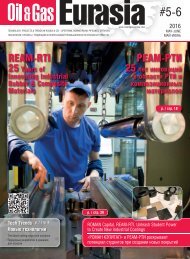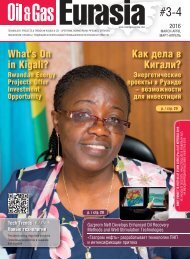Oil&Gas Eurasia July-August 2016
July-August issue of Oil&Gas Eurasia magazine
July-August issue of Oil&Gas Eurasia magazine
You also want an ePaper? Increase the reach of your titles
YUMPU automatically turns print PDFs into web optimized ePapers that Google loves.
INDUSTRIAL SAFETY<br />
#7-8 <strong>July</strong>-<strong>August</strong> <strong>2016</strong><br />
Около 4 000 юрлиц получили лицензию Ростехнадзора<br />
на проведение экспертизы. Вход на этот рынок до осени<br />
2015 года был упрощен предельно: для получения лицензии<br />
фирме было достаточно иметь в штате одного аттестованного<br />
эксперта, даже если по образованию он ветеринар или<br />
скрипач. Как заметил на парламентских слушаниях глава<br />
правового управления Ростехнадзора Дмитрий Яковлев, «на<br />
рынок хлынули однодневки-посредники».<br />
До 370 тыс. экспертиз в год выполняется в России. Около<br />
80% всех экспертиз – на техническое перевооружение и<br />
продление нормативных сроков безопасной эксплуатации<br />
оборудования, зданий и сооружений ОПО. Нормативноправовые<br />
акты, устанавливающие порядок экспертизы в<br />
этих сегментах,требуют конкретизации (на это указано в<br />
рекомендациях парламентских слушаний от 04.02.<strong>2016</strong>).<br />
К 2014 году Ростехнадзор перестал утверждать экспертизы<br />
по промышленной безопасности, введя уведомительный<br />
порядок их регистрации. Качество экспертизы<br />
резко ухудшилось. По оценке Ростехнадзора, на тот момент<br />
минимум треть экспертных организаций была недобросовестной.<br />
С 1 января 2014 года введена уголовная ответственность<br />
эксперта за составление заведомо ложной экспертизы<br />
и штраф для юридического лица за аналогичное нарушение.<br />
Но эксперт-нарушитель в случае угрозы уголовной<br />
ответственности ссылался на выводы лаборатории-юрлица,<br />
а лаборатория отделывалась штрафом или исчезала.<br />
К концу 2014 года ситуация настолько осложнилась,<br />
что потребовалось вмешательство президента РФ.<br />
Минэнерго уже высказало озабоченность в связи с<br />
возможным срывом контрактов на техническое перевооружение<br />
предприятий, работающих в зоне ответственности<br />
министерства, – они заказчики львиной доли промышленных<br />
экспертиз. Однако Ростехнадзор считает все происхоthat<br />
had been carried out apparently for the writing-off<br />
of amounts.<br />
About 4,000 legal entities received the<br />
Rostekhnadzor license for examination. Entrance to<br />
this market has been extremely simplified until the<br />
autumn of 2015: to obtain a license if was enough for<br />
the company to have a staff of certified experts, even if<br />
the education was veterinarian or violinist. As the head<br />
of Rostekhnadzor Legal Department Dmitry Yakovlev<br />
noted at the parliamentary hearings, “intermediate<br />
sellers-shadow companies rushed to the market”.<br />
In Russia, up to 370,000 examinations per year<br />
are conducted. About 80 percent of all examinations<br />
are in the modernization and extension of the normative<br />
terms of safe operation of equipment, buildings<br />
and facilities of HIF. Normative legal acts establishing<br />
the procedure for the examination in these segments<br />
require specification (indicated on the recommendations<br />
of the parliamentary hearings of 02.04.<strong>2016</strong>).<br />
By 2014 Rostekhnadzor has stopped approving<br />
industrial safety expertise, and introduced notification<br />
procedure for their registration. Examination quality<br />
has deteriorated sharply. According to Rostekhnadzor<br />
estimates, at that time at least a third of expert organizations<br />
was unfair.<br />
On January 1, 2014 criminal responsibility of the<br />
expert was introduced for drawing up the deliberately<br />
false expertise and a fine for a legal entity for the same<br />
violation. However, in jeopardy, expert-infringer relied<br />
on laboratory-legal entity findings, and laboratory put<br />
off with the fine or disappeared.<br />
By the end of 2014, the situation has become<br />
so complicated that it took the intervention of the<br />
President of the Russian Federation.<br />
Rybas Alexander, Ph.D. (Engineering), D.Sc.<br />
(Economics), State Secretary — Deputy Head<br />
of Rostekhnadzor<br />
At the parliamentary hearings in February <strong>2016</strong>,<br />
Rybas stated the department’s position: “As Viktor<br />
Khristenko said once, a camel is an Arabic horse that<br />
passed the procedure of inter-ministerial coordination.<br />
That’s why we have to finalize the rules and method<br />
of industrial safety experts certification based on<br />
the expert community’s opinion.<br />
The State moves towards a risk-based approach,<br />
and we need objective information about the state<br />
of HIF. With the examination quality we have now,<br />
a dynamic model of risk assessment is unfeasible.<br />
Also, the investments allotted for the replacement of<br />
fixed assets currently will be used to prolong the industrial facilities<br />
operation. How it will be done depends on the examination quality. Of<br />
course, some issues could be addressed within the SROs framework.<br />
However, the SROs operate effectively only where there is a responsible<br />
professional community, and the industry expertise market is highly<br />
criminalized. From 4,500 expert organizations that have obtained the<br />
licenses, only 400 really work. The rest have been created to carry out<br />
a couple of examinations; afterwards they either do nothing or disappear.<br />
With regard to certification itself, there is nothing to worry about:<br />
two hours is enough to answer 200 questions, and those who have<br />
passed the test, answered those questions before the time expired.”<br />
Александр Рыбас, к.т.н., д.э.н., статс-секретарь —<br />
заместитель руководителя Ростехнадзора<br />
На парламентских слушаниях в феврале <strong>2016</strong> года Рыбас<br />
так сформулировал позицию ведомства: «Как говорил<br />
в свое время Виктор Христенко, верблюд – это арабский<br />
скакун, прошедший процедуру межведомственного<br />
согласования. Поэтому правила и способ аттестации экспертов<br />
по промышленной безопасности будем дорабатывать<br />
с учетом мнения экспертного сообщества.<br />
Государственный курс – переход на рискориентированный<br />
подход. Для него нам нужна объективная<br />
информация о состоянии опасных промышленных<br />
объектов, а при таком качестве экспертизы, которое есть<br />
сейчас, динамическая модель оценки рисков невозможна.<br />
Кроме того, инвестиции, запланированные на обновление<br />
основных фондов, сейчас пойдут на продление сроков эксплуатации<br />
промышленных объектов. Как это будет сделано, зависит от качества<br />
экспертизы. Конечно, какие-то вопросы можно было урегулировать<br />
в рамках СРО. Но СРО эффективно работают только там, где есть ответственное<br />
профессиональное сообщество, а рынок промышленной экспертизы<br />
чрезвычайно криминализирован. Из 4 500 экспертных организаций,<br />
которым выданы лицензии, реально работает 400 – остальные<br />
создаются ради одной-двух экспертиз и потом либо бездействуют, либо<br />
исчезают. Что касается самой аттестации, то ничего страшного в ней нет:<br />
2 часа на 200 вопросов вполне достаточно, те, кто ее прошел, отвечают<br />
до истечения этого времени».<br />
44<br />
Oil&<strong>Gas</strong>EURASIA


